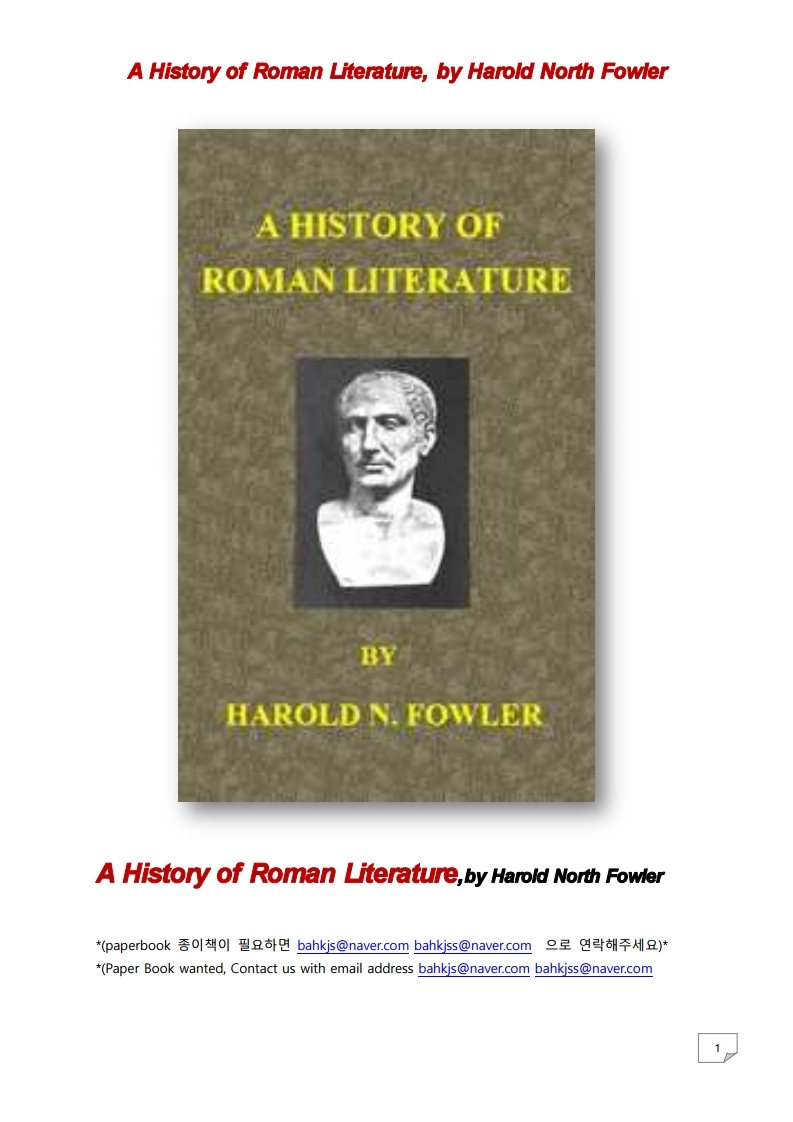인문 > 영미문학이론
로마제국문학의 역사.A History of Roman Literature, by Harold North Fowler
This book is intended primarily for use as a text- book in schools and colleges. I
have therefore given more dates and more details about the lives of authors
than are in themselves important, because dates are convenient aids to
memory, as they enable the learner to connect his new knowledge with
historical facts he may have learned before, while biographical details help to
endow authors with something of concrete personality, to which the learner can
attach what he learns of their literary and intellectual activity.
Extracts from Latin authors are given, with few exceptions, in English translation.
I considered the advisability of giving them in Latin, but concluded that extracts
in Latin would probably not be read by most young readers, and would
therefore do less good than even imperfect translations. Moreover, the texts of
the most important works are sure to be at hand in the schools, and books of
selections, such as Cruttwell and Banton’s Specimens of Roman Literature,
Tyrrell’s Anthology of Latin Poetry, and Gudeman’s Latin Literature of the
Empire, are readily accessible. I am responsible for all translations not
accredited to some other translator. In making my translations, I have employed
blank verse to represent Latin hexameters; but the selections from the Æneid
are given in Conington’s rhymed version, and in some other cases I have used
translations of hexameters into metres other than blank verse.
In writing of the origin of Roman comedy, I have not mentioned the dramatic
satura. Prof. George L. Hendrickson has pointed out (in the American Journal
of Philology, vol. xv, pp. 1- 30) that the dramatic satura never really existed, but
was invented in Roman literary history because Aristotle, whose account of the
origin of comedy was closely followed by the Roman writers, found the origin of
Greek comedy in the satyr- drama.
The greater part of the book is naturally taken up with the extant literary works
and their authors; but I have devoted some space to the lives and works of
authors whose writings are lost. This I have done, not because I believe that the
reader should burden his memory with useless details, but partly in order that
this book may be of use as a book of reference, and partly because the
mention of some of the lost works and their authors may impress upon the
reader the fact that something is known of many writers whose works have
survived, if at all, only in detached fragments. Not a few of these writers were
important in their day, and exercised no little influence upon the progress of
literature. Of the whole mass of Roman literary production only a small part―
though fortunately in great measure the best part―now exists, and it is only by
remembering how much has been lost that the modern reader can appreciate
the continuity of Roman literature.
The literature of the third, fourth, and fifth centuries after Christ is treated less
fully than that of the earlier times, but its importance to later European
civilization has been so great that a summary treatment of it should be included
even in a book of such limited scope as this.인문 > 영미문학이론
로마제국문학의 역사.A History of Roman Literature, by Harold North Fowler
This book is intended primarily for use as a text- book in schools and colleges. I
have therefore given more dates and more details about the lives of authors
than are in themselves important, because dates are convenient aids to
memory, as they enable the learner to connect his new knowledge with
historical facts he may have learned before, while biographical details help to
endow authors with something of concrete personality, to which the learner can
attach what he learns of their literary and intellectual activity.
Extracts from Latin authors are given, with few exceptions, in English translation.
I considered the advisability of giving them in Latin, but concluded that extracts
in Latin would probably not be read by most young readers, and would
therefore do less good than even imperfect translations. Moreover, the texts of
the most important works are sure to be at hand in the schools, and books of
selections, such as Cruttwell and Banton’s Specimens of Roman Literature,
Tyrrell’s Anthology of Latin Poetry, and Gudeman’s Latin Literature of the
Empire, are readily accessible. I am responsible for all translations not
accredited to some other translator. In making my translations, I have employed
blank verse to represent Latin hexameters; but the selections from the Æneid
are given in Conington’s rhymed version, and in some other cases I have used
translations of hexameters into metres other than blank verse.
In writing of the origin of Roman comedy, I have not mentioned the dramatic
satura. Prof. George L. Hendrickson has pointed out (in the American Journal
of Philology, vol. xv, pp. 1- 30) that the dramatic satura never really existed, but
was invented in Roman literary history because Aristotle, whose account of the
origin of comedy was closely followed by the Roman writers, found the origin of
Greek comedy in the satyr- drama.
The greater part of the book is naturally taken up with the extant literary works
and their authors; but I have devoted some space to the lives and works of
authors whose writings are lost. This I have done, not because I believe that the
reader should burden his memory with useless details, but partly in order that
this book may be of use as a book of reference, and partly because the
mention of some of the lost works and their authors may impress upon the
reader the fact that something is known of many writers whose works have
survived, if at all, only in detached fragments. Not a few of these writers were
important in their day, and exercised no little influence upon the progress of
literature. Of the whole mass of Roman literary production only a small part―
though fortunately in great measure the best part―now exists, and it is only by
remembering how much has been lost that the modern reader can appreciate
the continuity of Roman literature.
The literature of the third, fourth, and fifth centuries after Christ is treated less
fully than that of the earlier times, but its importance to later European
civilization has been so great that a summary treatment of it should be included
even in a book of such limited scope as this.





